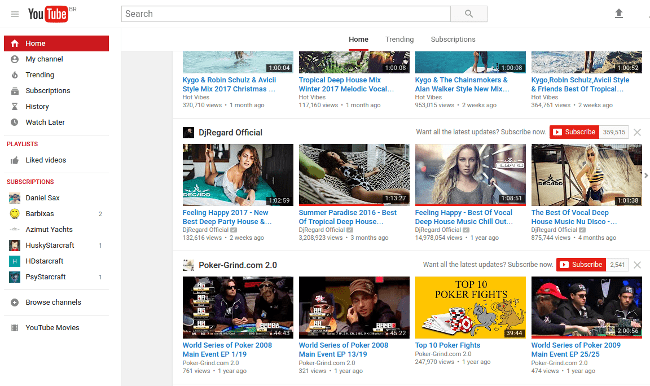How to Make Money with Videos Online - DailyBlogTips |
| How to Make Money with Videos Online Posted: 26 Jan 2017 02:57 AM PST Even since fast Internet connections around the world became the standard, video has been a dominating force online. The explosion of smartphones and mobile Internet only reinforced this trend, as people are now able to watch videos on the go and 24 hours per day. Guess what, if you want to make money online, you certainly need to consider a strategy that involves video. Below you'll find some tips to help you in this path. 1. Know The Business Models There are basically two available business models to make money with online video: release the videos for free and earn with advertising, or charge a fee to let users access your videos. The first model is suitable for videos that will attract a large number of views on platforms like YouTube or Facebook. Funny videos and videos about celebrities, technology, politics or other popular topics tend to do well under this model. Keep in mind that you will need to publish many videos for this model to become profitable. It's not uncommon to see publishers releasing several videos on the same day! The second model is suitable for premium and educational content. For instance, educational videos that teach people how to program or build websites, how to earn money through investing, or how to gain skills necessary to make money on some professional field. The advantage of this model is that you will need to produce fewer videos, but it will take some work to produce the videos and to structure the learning platform. 2. Use a Professional Hosting Platform Especially if you are going with the second model, using a professional platform to host your videos is essential. Online video streaming is complex, and if you try the do-it-yourself approach you might end up causing problems for your paying customers. If you need a recommendation, check out UScreen. It is one of the most popular platforms around, and it has the advantage of coming with several other services that you might need for your educational or premium video website. For instance, they have tools that will help you build your landing page and video pages. They also have built-in payments for both subscriptions and one-time payment for the videos. This can save you a lot of time if you don't have technical know-how. 3. Have Your Own Website If you are going to release videos on YouTube and make money via advertising, you might think that you don't need to have a website. Even if you are going to charge for premium videos, you might be tempted to use some third party platform instead of hosting your own domain name. This is a mistake. You need to have your own domain and promote it to your audience. That is because your own domain and site is pretty much the only online presence you control 100%. If your audience get used to visiting your site, subscribing to your email list and so on, you will never risk getting cut out of the business by external circumstances. Imagine the despair of people who published all their videos on an external platform that went out of business and decided to shut down the website! You could lose everything overnight. If you are not a technical personal, check out SquareSpace, as it is pretty easy to build a website with them. 4. Leverage Social Media Like it or not, social media is an essential part of any marketing plan these days. You will need to have, at the very least, a presence on Facebook and Twitter. Pinterest, Instagram and LinkedIn are also recommended options, depending on your target audience. Make sure that you share all your videos on those platforms, as they can drive a lot of views. Facebook, for instance, is already the second largest video platform online, losing only to YouTube. Original post: How to Make Money with Videos Online |
| Are Keywords Still Important When it Comes to SEO? Posted: 25 Jan 2017 03:22 PM PST There was a time not too long ago where keywords were the end all be all of SEO. All webmasters had to do was to fill their pages with specific keywords, use optimized anchor text for backlinks, add keyword rich headers and title tags, and voila! You had a fully optimized website. While things may have been more simple from a marketing plan, they completely undermined Google’s product offering. Many people forget that Google's main goal is to provide the most relevant search engine results to its users and keyword manipulation techniques meant that their algorithm was easy to circumvent. And for this reason, Google hit webmasters with update after update to make sure that things like keyword density would not hold the same weight in future rankings. However, keywords aren’t completely dead and are still in many ways the backbone of SEO. They just have to be approached differently. Let's take a look at how the role of keywords has changed when it comes to search engine optimization. Keyword Placement Google still needs the use of text, and therefore, keyword placement still plays a major role when it comes to search engine rankings. However, keyword placement will do more for your site than keyword stuffing or keyword rich backlinks. Placing your main keywords in your title and headers is still an important part of any on page SEO marketing strategy, and this probably will be the case for years to come, unless Google makes a huge change in the way pages are indexed. Title tags play an essential part in search results, and poorly optimized title tags will always yield negative results. Google still gives priority to key areas, such as meta information and headers, followed by copy and navigation last. It is therefore capital that you optimize these key areas with a variety of keywords so that tags across your site do not become redundant. Keyword Meaning Google is doing everything in its power for its algorithm to be more "plastic" and tailor itself to the user's needs. It is also trying to make its algorithm more human by not only identifying keywords and indexing them, but by deriving meaning from them as well. Google is constantly changing its algorithm so that it can make correlations between keywords on a specific page to allow it to make sense of what the page is truly about. For instance, different iterations of the same keyword phrase are less likely to rank for different search terms than they were before. So, you should forget about adding specific keyword phrases to your pages and rather focus on a consistent theme throughout your pages that will allow them to rank naturally for certain keywords. So what does it mean for SEO Marketers? It simply means that keywords are not completely obsolete, but our approach to them has to be changed. Instead of focusing on keywords, webmasters should focus on the human aspect of search and focus on providing relevant content rather than creating content for machines. As technologies such as machine learning are being introduced, the gap between man and machine is drawing consistently closer, and this should prompt SEO marketers to move towards other facets of SEO such as user experience if they want to be more successful in the future. Original post: Are Keywords Still Important When it Comes to SEO? |
| You are subscribed to email updates from Daily Blog Tips. To stop receiving these emails, you may unsubscribe now. | Email delivery powered by Google |
| Google Inc., 1600 Amphitheatre Parkway, Mountain View, CA 94043, United States | |





0 comments:
Post a Comment